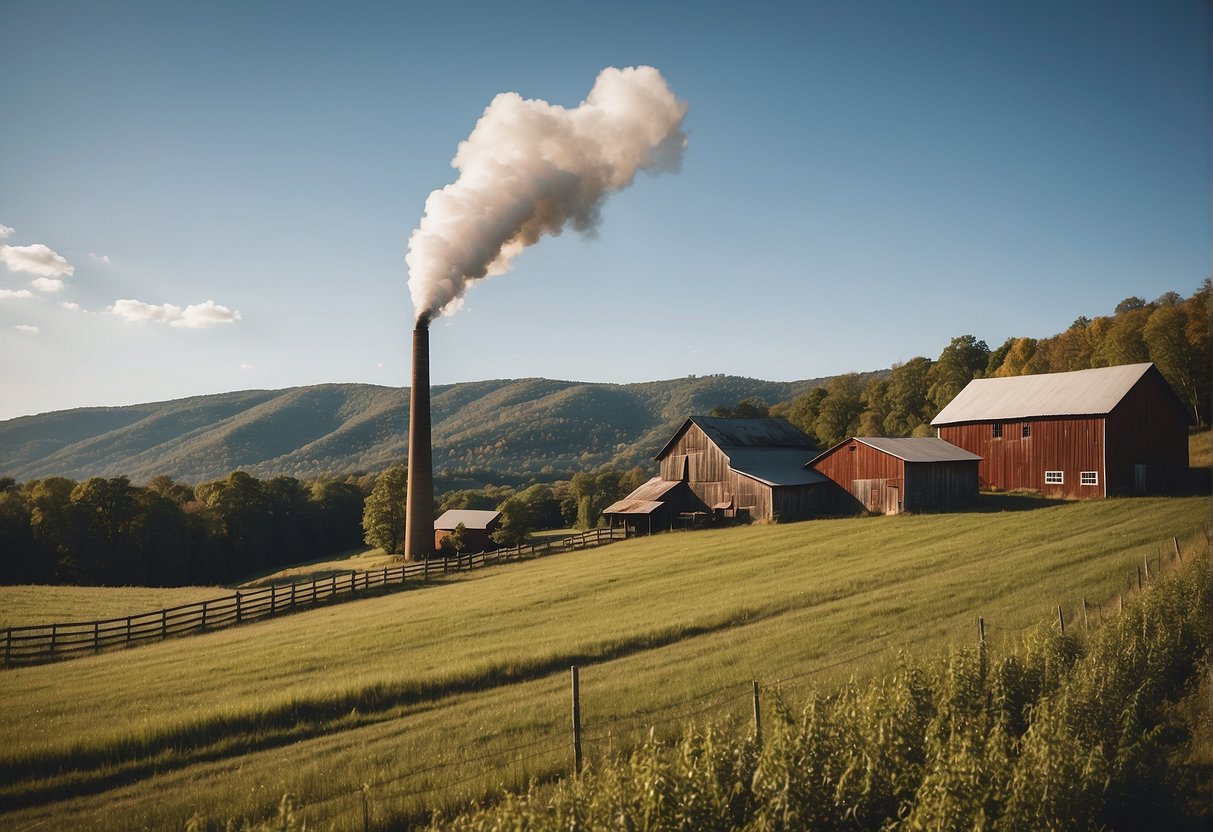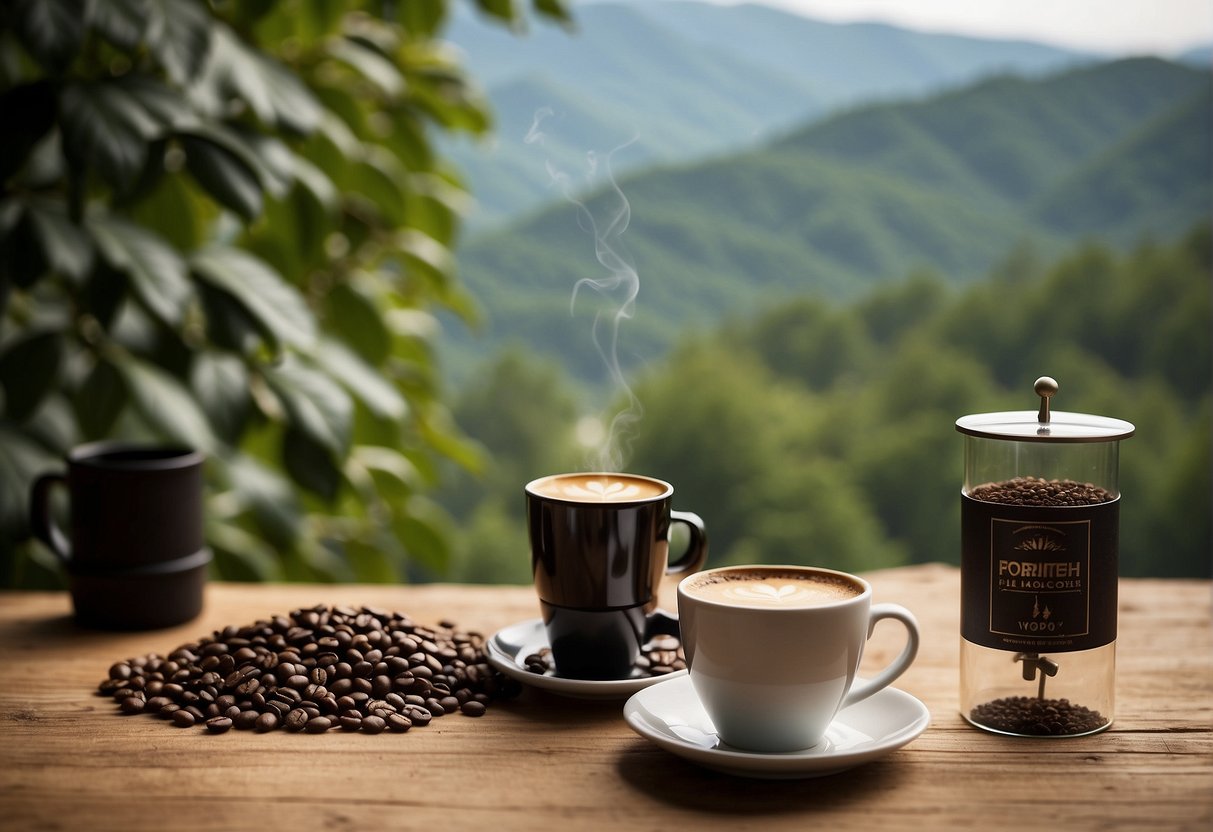West Virginia, often lauded for its scenic beauty and rich history, is also becoming known for its burgeoning coffee culture. Amid the rolling hills and the crisp mountain air, local coffee roasters are crafting unique blends and single-origin coffees that are gaining popularity. These artisans combine their deep passion for coffee with the state’s storied tradition, producing roasts that cater to a variety of palates.

Local roasters like West Virginia Coffee Co. and Mountain Roaster Coffee have dedicated themselves to creating fresh, high-quality coffee. Their processes, often reflecting meticulous attention to detail, result in flavorful and aromatic coffee experiences. They offer a range of products, from light and delicate to dark and robust roasts, engaging coffee enthusiasts and casual drinkers alike.
Each roastery, with its unique approach to sourcing beans and roasting techniques, contributes to West Virginia’s distinct coffee scene. They’re not just businesses but integral parts of the community, providing a warm, inviting space for locals and visitors to enjoy a cup of West Virginia’s finest coffee. Embracing tradition while fostering innovation, these coffee roasters encapsulate the spirit of the Mountain State.
The Art and Science of Coffee Roasting
https://www.youtube.com/watch?v=WMfy4T06xao&embed=true
The careful application of heat to transform the chemical and physical characteristics of coffee beans is both a precise science and a form of artistry. West Virginia’s coffee culture celebrates this duality, where skilled roasters like those at Aroma of the Andes fuse tradition with technology to enhance the beans’ natural flavors.
Understanding the Roasting Process
Coffee roasting is the critical step that turns green coffee beans into the aromatic brown beans that are ready for brewing. It’s a complex process involving a series of chemical reactions. When heat is applied to the beans, it initiates the Maillard reaction, a pivotal chemical process that develops the complex flavor profile coffee lovers cherish. Roasters in West Virginia must contend with the intricacies of this process, as the altitude and climate can influence the roast.
The Role of Temperature and Time
Temperature and time are the two fundamental parameters that a coffee roaster manipulates to achieve the desired roast level, which can range from light to dark. The optimal roasting temperature typically falls between 180°C and 240°C (356°F and 464°F). The total time a coffee bean spends roasting directly correlates with its final taste; shorter roast times typically produce lighter roasts with higher acidity, while longer times invite a fuller body and smoother taste profile. Roasters like those at Aroma of the Andes must monitor these elements carefully to ensure a consistent quality that reflects their signature roast style.
Renowned Coffee Roasters in West Virginia

West Virginia takes pride in its local coffee scene, boasting a variety of coffee roasters known for their dedication to quality and unique roasting techniques.
Black Dog Coffee Company
Black Dog Coffee Company has gained acclaim for letting customers observe the coffee roasting process firsthand. Located in Shenandoah Junction, this roaster distinguishes itself with beans roasted on-site, ensuring a fresh and flavorful cup every time.
Mountaineer Roasting Company
Boasting a strong commitment to local sourcing and community involvement, Mountaineer Roasting Company provides coffee enthusiasts with a variety of options that suit different preferences. From single-serve brewers to professional espresso setups, they focus on delivering coffee and equipment that meets specific customer needs.
Aroma of the Andes
Specializing in single-origin coffees, Aroma of the Andes brings to the table carefully sourced beans from the high mountains of Colombia. They go beyond just selling coffee, emphasizing sustainable farming practices and direct support to farmers to produce coffee with a rich, authentic flavor profile.
Sourcing and Sustainability Practices

Coffee roasting in West Virginia reflects a commitment to both quality and responsibility. Roasters in this region have embraced practices that prioritize ethical and sustainable sourcing of coffee beans.
Ethical Sourcing Initiatives
Direct Trade Coffee: Many West Virginia coffee roasters have adopted direct trade practices to ensure fair compensation for coffee farmers. This direct engagement not only helps improve the livelihood of coffee producers but also contributes to a more sustainable environment by encouraging farmers to use eco-friendly cultivation methods. For example, the Direct Trade Coffee model is central to ethical sourcing and sustainability, as it enhances transparency and trust between roasters and farmers.
Sustainable Labels: Some roasters opt to use certifications such as the Direct Trade label. These labels signal to consumers that the coffee has been sourced with attention to both the well-being of producers and environmental stewardship. These sourcing decisions are crucial as they reflect a roaster’s commitment to sustainability. Coffee roasters’ decisions and use of such labels are often influenced by a combination of business-oriented and social motivations, as evidenced by research insights.
Local vs. Global Coffee Sourcing
-
Local Sourcing: Some West Virginia roasters prioritize local sourcing when possible, assisting in community growth and minimizing environmental impact. By sourcing locally, roasters can reduce the carbon footprint associated with coffee transportation.
-
Global Relationships: Since coffee is a tropical crop not native to West Virginia, roasters must establish global relationships. Balancing local economic support and the need for imported coffee, they often source beans from international regions known for specific flavor profiles, while still upholding sustainable practices. This gives rise to a diverse selection of coffee while supporting a global coffee community committed to ethical practices as illustrated by the specialty coffee roasters in the region.
In approaching sourcing, West Virginia roasters demonstrate that it’s possible to support both local economies and global farmers, aligning their sourcing strategies with environmental and social good.
Brewing the Perfect Cup at Home and Cafe
Whether at home or in a cafe, mastery of brewing techniques and understanding the nuances of coffee blends are essential for crafting the perfect cup. Precision in every step, from the grind to the pour, influences the final flavor and strength of the coffee.
Home Brewing Techniques
At home, enthusiasts should start with selecting quality coffee blends. In West Virginia, local roasters offer beans with unique flavor profiles, often noted for their robust and varied tasting notes such as those found at Aperture Coffee Roasters.
- Grinding the coffee to the correct coarseness is vital. A fine grind is typically best for espresso, while a coarser grind is ideal for French press or pour-over.
- Water Temperature needs to be between 195°F and 205°F to optimally extract flavors.
- The Brew Ratio of water to coffee is crucial, with a general guideline of 1:16 for a balanced cup.
- Brew Time also affects strength and taste; experimenting with different durations can lead to the perfect brew, according to preferences.
Individuals can enhance their brewing repertoire by trying various methods like pour-over, French press, or using an espresso machine to discover which technique suits their taste best, aligning with tips from Java Love Roasters.
Barista Secrets for the Best Cappuccino
In a cafe, baristas employ specific techniques to ensure the best cappuccino.
- Milk Steaming: Achieving the right texture of milk, which is creamy but still pourable, is a secret behind a great cappuccino. The milk should be steamed until it reaches a velvety consistency, without large bubbles.
- Espresso Extraction: The foundation of a cappuccino is a well-extracted shot of espresso, which should be rich and full-bodied. Ensuring the espresso machine is dialed in correctly is key to a consistent shot each time.
- Layering: The perfect cappuccino has equal parts of espresso, steamed milk, and milk foam, creating a harmonious balance of flavors and textures when sipped.
Industry experts, like those at Trade Coffee, suggest that attention to detail in every aspect of the brewing process is what sets an outstanding cappuccino apart from an average one. Adaptation and precise technique are what allow baristas to consistently deliver exceptional coffee beverages.
Connecting with the Coffee Community
West Virginia’s coffee roasters are not just passionate about producing exceptional coffee—they are dedicated to creating experiences that bring the community together. They focus on fostering a journey that draws customers into the world of coffee through events, tastings, and educational endeavors.
Events and Tastings
At the heart of local coffee culture are the events and tastings that places like Bear House Coffee and other roasters host. These gatherings range from informal coffee cuppings, where aficionados can savor and discuss new roasts, to larger events highlighting the rich tapestry of coffee. They’re occasions where individuals not only indulge in the sensory experiences of coffee but also form part of a broader, coffee-appreciating community.
Customer Engagement and Education
Critical to the coffee experience is the education and engagement approach adopted by roasters such as Aperture Coffee Roasters. Interactive workshops and discussions about brewing methods aim to enlighten the consumer’s coffee journey, elevating their daily java routine to an informed ritual. Roasters serve as guides, deepening customers’ appreciation for coffee by elucidating its origins, the roasting process, and the subtleties of flavor profiles.
